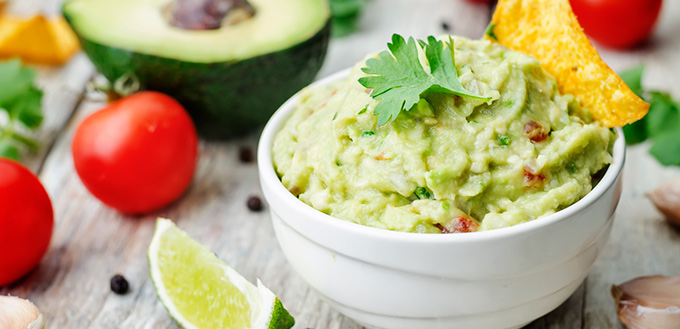When eating at the dining table or cooking in the kitchen, your dog’s eyes may tempt you into offering it a few scraps. While it has been established that a dogs’ digestive tract is incredibly resilient, and tiny bits here and there may not lead to any harm, those foods that are certified safe for humans might actually be toxic to dogs. So, while on this topic, let’s take a look at guacamole. While guacamole is viewed as a healthy meal for humans, it is prepared with ingredients that are not so great for the dog palate. The ingredients in question such as onions, garlic, tomatoes, and the likes, might sound as simple everyday stuff, but the reverse is the case when you introduce them into a canine digestive tract. For further information, this article will further address the question ”is guacamole bad for dogs” and what to do if your dog ate guacamole.

Can Dogs Eat Avocados
To give a detailed answer to the above question, we need to consider the content of a typical guacamole dish, especially the ones that have been marked as toxic to dogs. The main ingredient of guacamole is avocado, that creamy green fruit that is usually mixed with salt and lime juice. However, some guacamole recipes also include onions, cilantro, tomatoes, garlic, and spices such as cayenne or cumin.
Avocado is arguably the most unsafe ingredient for a dog. In fact, it is thanks to the presence of avocado in guacamole that experts have listed the food as toxic for our canine friends. If you often allow your pooch to nimble on avocado fruits, then hear this: No part of the green fleshy fruit is safe for a pup – from the bark to the fruit, the leaf, and other parts. The reason is that all parts of the fruit are replete with persin, which is a substance capable of causing ailments like diarrhea, breathing problems, nasal congestion, and vomiting. In addition, Persin can give rise to an accumulation of fluid around a canine’s heart. According to findings, it is the Guatemalan variety of the fruit that has a high concentration of persin – a good example is Hass.
Important to note that it is the unripe flesh of the avocado that contains persin, the toxic substance is not found in the ripe flesh. The highest risk occurs when a dog ingests the pit of avocado fruit, and if it happens that the dog swallowed the whole pit, bowel obstruction can be expected. Even when the fruit is properly chewed before swallowing, the pieces can still cause severe health issues – notable among them are intestinal punctures. The best thing is to keep your pooch away from the dangers of ingesting avocadoes since it is not good in any form all. In addition, the high-fat content of the avocado can lead to an upset stomach if the fruit is consumed in excess.
Is Guacamole Bad for Dogs?
Apart from the avocado content of guacamole, various other ingredients in avocadoes are also considered toxic to dogs. Let’s take a look at some of them:
- Onion and garlic
Both garlic and onions come from the same family, whether dehydrated, fresh, cooked, or powdered. They might be quite good for the preparation of your guacamole but are certainly bad for the dogs.
According to various reports, the thiosulphate content of onions can impair a dog’s red blood cells, which will, in turn, lead to a lack of blood or anemia. The symptoms that may result from eating onions may take up to three days before they manifest. There are even cases where the incubation period lasted up to five days before the dog started showing signs of weakness. Your previously active pooch may become averse to moving from one spot and might get tired easily. These signs in a dog that is suspected of having ingested onions should prompt the owner to inspect its urine – it may have turned red or dark orange in color. Other symptoms of onion toxicity in canines include the likes of weight loss, vomiting, pale gums, and diarrhea. The rest are drooling and abdominal pain.
And as expected, garlic, which comes from the same family as onions, still produces similar symptoms. The only difference is that the toxicity in garlic is in lesser amounts. With garlic, the symptoms may not manifest until after four days.
- Salt
Another ingredient to be avoided is salt, though toxicity may not arise from ingesting a negligible quantity of salt; it is recommended that pet parents desist from feeding their dogs with salty food. Findings have shown that when dogs ingest excessively salted foods, it can result in increased urination, excessive thirst, diarrhea, and vomiting. Other canine health issues associated with salt ingestion include tremors, depression, increased body temperature, seizures, and possibly, death may follow.
- Jalapeno and cayenne
Both cayenne and jalapeno are spicy and dogs are known to be sensitive to foods that are spicy. It is common knowledge that cayenne is very therapeutic, but it may lead to an upset stomach when ingested in excess. Jalapeno peppers are even worse than cayenne – the reason is that they are spicier and can lead to health conditions like diarrhea or vomiting when consumed by a dog that has a sensitive stomach.

My Dog Ate Guacamole: What are the Possible Remedies?
When a dog ingests any food that is marked toxic, a lot of factors will come to play in dictating whether the pup will fall sick or not. Notable among the factors is the quantity of food ingested and the body size of the canine. Minor gas may be observed from a Great Dane that ingested two spoons of guacamole. However, the attention of the vet will be urgently needed for a Yorkshire Terrier that gulped down a big serving of guacamole. Ultimately, it is the excessive ingestion of the avocado dish that should give rise to concern. Little or no harm may come from consuming negligible quantities.







